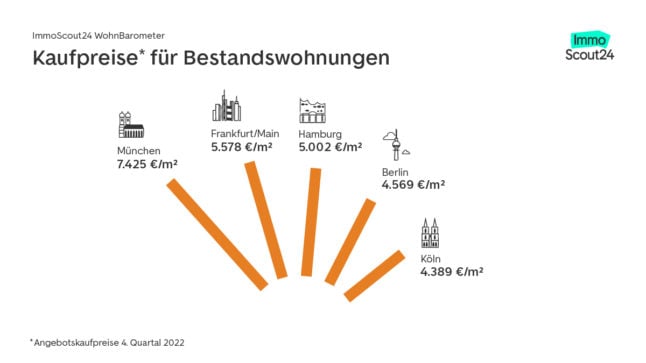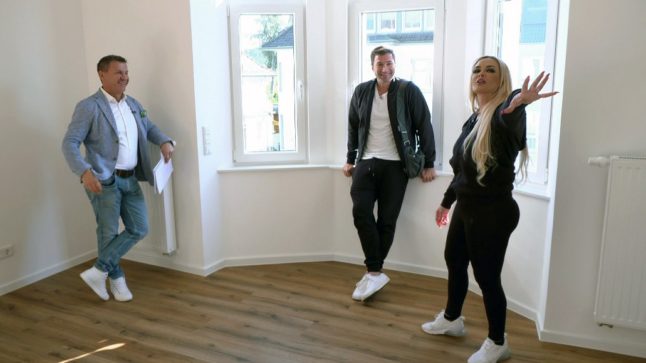Even with interest rates rising on the back of higher inflation, Peter Kleinwächter, a mortgage broker and financial consultant with MLP Berlin, says people looking to buy in Germany right now might have an interesting window of opportunity – depending on their situation.
“Buyers are in a good position right now, especially if they’re buying from developers,” he said during an interview with The Local’s Germany in Focus podcast, released on Friday February 3rd. Kleinwächter says his business is down to about half of what it is normally. Higher interest rates have scared off many buyers, many of whom simply can’t afford a mortgage right now – even if they have the necessary deposit.
That’s pushing prices down for those buyers still left on the market and giving them a bit more leverage in negotiations. However, Kleinwächter says the window of opportunity won’t always be around for people who want to take advantage of it. He expects house prices to go back up in the medium term.
Escaping the rental market
Another reason that buyers may been keen to get on the housing ladder in Germany is escaping the private rental market, where rents have been spiralling.
“We have the highest increase in rents that we’ve seen since the 1970s,” Kleinwächter says.
“The pressure on the market is still quite high, especially in the big cities,” he explains, pointing out how housebuilding targets are getting missed around the country, meaning there isn’t enough supply to meet housing demand. He also says he doesn’t anticipate housebuilding targets to be met anything soon and admission also made by the government in recent weeks. That’ll keep prices high even if interest rates eventually go down.
Numbers from builders bear this out too, with around 74 percent of all German construction companies experiencing delays and a full third having cancelled projects due to rising prices for materials. Hanover’s Pestel Institute reckons the country has a shortage of around 700,000 homes.
READ ALSO: German government set to miss target for new homes this year
Kleinwächter says anyone looking to buy now could be able to take advantage of higher interest rates later, if they’re comfortable with some risk.
“Bite the bullet and accept higher interest rates,” he says. “Collect as much of a deposit as you can.”
He also points out the rates for 10-year, 15-year, or 20-year mortgages are fairly similar right now. A buyer comfortable with some risk can lock in current interest rates for 10 or even five years, and then refinance when interest rates go down – as many experts expect them to.
“High interest rates are poison for the economy,” says Kleinwächter, pointing out the European Central Bank will want to lower them again once inflation gets more under control.
READ ALSO: What experts say will happen to the German housing market in 2023
As The Local has been reporting, house prices have recently fallen by as much as ten percent in Germany, depending on the area.
According to the latest survey from property portal ImmoScout24, even major cities like Munich, Frankfurt, and Berlin – which have seen a 63 percent increase in price over the last five years – haven’t escaped the price drop. That said, the price decline is much less pronounced in some places than in others. Düsseldorf saw the biggest fall at a decrease of around 10 percent. Frankfurt saw the smallest, at 2.8 percent.

Overall, existing flats slipped 4.3 percent in price in the last quarter of 2022 to €2,714 per square metre, while new-build flats were down 6.4 percent to €3,901 per square metre . Meanwhile, existing single family homes fell 4.5 percent and new-build houses 2.7 percent.
Big differences still exist between cities. According to market reports at the end of 2022, buyers in Munich are on the high end, and can expect to shell out €7,425 per square metre. Frankfurters, on average, have to pay considerably less, at €5,578 per square metre. Berliners were paying around €4,569 per square metre at the end of last year and people in Cologne €4,389 per square metre.
Despite the slip in the final quarter of the year, however, house and flat prices in Germany generally remained higher than they were at the end of 2021.
READ ALSO: REVEALED: How property prices in Germany are sinking dramatically


 Please whitelist us to continue reading.
Please whitelist us to continue reading.
In 2019, I bought the flat that I had rented for 119,000 € in Freiburg. I paid 19,000 € upfront and borrowed the other 100,000 € from my bank, getting a fixed term 10 year mortgage at a very reasonable interest rate (under 1.5%).
Here is a valuable tip. When you negotiate a mortgage with a bank, ask about a Sondertilgung (interest free yearly optional payment). The bank will allow you to pay off an extra fixed amount each year (in my case 5000 €) without charging interest.